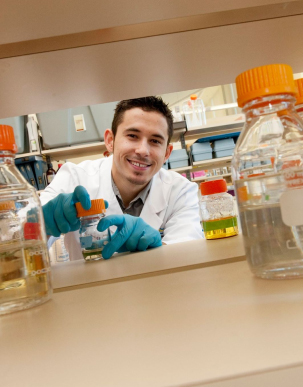Rochester Bridges to the Doctorate


Rochester Bridges to the Doctorate
- RIT/
- National Technical Institute for the Deaf/
- Deaf Health Care and Biomedical Science Hub/
- Rochester Bridges to the Doctorate
Program Description
The Rochester Bridges to the Doctorate Program is the first of its kind that provides scientific mentoring for deaf and hard-of-hearing individuals to become strong candidates for doctoral degree programs in biomedical or behavioral science disciplines.
Bridges program participants, called "trainees," are enrolled in RIT MS degree programs, and simultaneously are mentored in University of Rochester laboratories on research projects that align with their interests.
Wrap Around Mentoring
Annual Stipend is set by the NIH and subject to change.
$28,244
Annual Stipend
16000
Up to Tuition Waiver $ Per Year
4
Research Lab Rotations
Who Should Apply?
To be considered for the Bridges program, students must be accepted into a qualifying RIT MS program.
Below are the key eligibility requirements
- Deaf and hard-of-hearing students accepted into a biomedical or behavioral science master’s degree program at RIT. See the list of accepted RIT’s master programs.
- Applicants must have an undergraduate GPA of 3.0 or higher.
- Must have a strong desire to become a biomedical or behavioral scientist.
For a detailed list of program expectations, visit the program guidelines page.
If you're an undergraduate looking for a similar program, check out U-RISE.
Application
Students intending to apply for the Bridges program should have:
- A minimum of a bachelor’s degree
- An undergraduate GPA of 3.0 or higher
- A strong desire to become a biomedical or behavioral scientist
- Applied and been accepted into one of the relevant RIT master’s degree programs
Once these criteria are met, applicants can submit an application for the Bridges program.
Required materials for the Bridges application:
- A personal essay explaining how the Bridges Program will assist in preparing for doctoral training and how it will help achieve the goal of becoming a Deaf scientist
- Undergraduate transcripts
- A resume or CV
- Three letters of recommendation, to be sent directly to bridges@rit.edu, and bcjntm@rit.edu.
Dr. Bonnie Jacob
RIT Multiple Principal Investigator
Dr. Steven Barnett
UR Multiple Principal Investigator
Dr. Elaine Smolock
UR, Education Co-Director
Dr. Patricia White
UR, Education Co-Director
Camille Oullette
RIT, PhD Readiness Director
Kat Womack
Biomedical Science Training Programs Interpreter
|
Mentors Professionals who are leaders in their research areas, passionate about guiding and training the next generation of researchers. Trainees The current Bridges trainees are exceptional Deaf and Hard-of-Hearing master’s students committed to advancing research and pursuing careers in behavioral and biomedical sciences. Alumni Learn about the successful graduates who have completed the program and their career paths. |
 |
News
Featuring news from across the community, explore past updates to see the impact made by Bridges scholars, alumni, and faculty. See more here.
The Deaf Hub News page also features community-wide events and updates. Visit Deaf Hub News.
Resources
The Rochester Bridges to the Doctorate Program shares valuable resources to inspire and empower future scientists. These resources support our students and benefit the broader community. Our collection of tools, including those hosted by our seminar series and more, helps prepare scientists for success in both academic and professional settings.
- Rochester Partnership for Research and Academic Career Training of Deaf Postdoctoral Scholars (RPP)
- World of Wonder (WoW) Science Seminar Series features Deaf and Hard-of-Hearing professionals, scientists, and researchers sharing personal journeys and careers in STEM fields.
- World of Wonder Speakers a collection of Deaf and Hard-of-Hearing professionals, scientists, and researchers who have shared their journeys and careers in STEM over the years.
- DHEP Seminar Series established with the launch of the Deaf Hub Lab in 2022, continues the legacy of WoW.
- Other Additional Resources
- Follow Deaf Hub's Socials for regular updates and events.
Contact Us
See our Bridges FAQs. If you have any other questions or want to learn more about the program, fill out the form below or email us at bridges@rit.edu.









